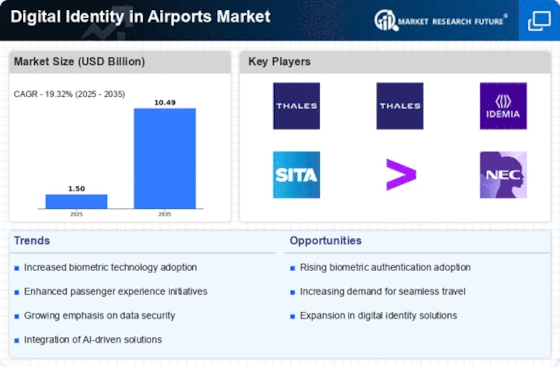Top Industry Leaders in the Digital Identity in Airports Market

Competitive Landscape of Digital Identity in Airports Market: An Analysis
The digital identity landscape in airports is experiencing a significant transformation, driven by the increasing demand for seamless and secure travel experiences. This has given rise to a dynamic and competitive market, attracting established players and innovative startups alike. Understanding the current landscape, key players, their strategies, and future trends is crucial for stakeholders navigating this rapidly evolving ecosystem.
Key Players:
-
NEC
-
Samsung SDS
-
Thales
-
Telus
-
IDEMIA
-
GBG
-
Tessi
-
Daon
-
ForgeRock
-
ImageWare
-
Jumio
-
iProov
-
ID R&D
-
Refinitiv
-
OneSpan
-
Smartmatic
-
Freja EID Group
-
Vintegris
-
AU10TIX
-
Signicat
-
Duo Security
-
Syntizen
-
Hashcash Consultant
-
Good Digital Identity
Strategies Adopted:
-
Partnerships and collaborations: Key players are forming partnerships with airlines, technology providers, and government agencies to create a robust ecosystem for digital identity solutions. This allows them to combine expertise, resources, and reach to provide comprehensive offerings.
-
Technology innovation: Continuous investment in research and development is crucial for staying ahead in this competitive market. Players are focusing on advancements in biometrics, artificial intelligence, and data security to enhance the efficiency and security of their solutions.
-
Focus on user experience: The user experience is at the forefront of strategy. Players are developing intuitive and user-friendly interfaces while ensuring data privacy and security.
-
Regional expansion: The potential for growth in emerging markets is driving players to expand their global footprint. Partnerships with local governments and adapting solutions to regional regulations are key tactics.
Factors for Market Share Analysis:
-
Portfolio breadth: The comprehensiveness of a player's product and service portfolio plays a significant role in attracting clients. Offering solutions across various touchpoints of the travel journey adds value.
-
Technology leadership: Continuous innovation and technical expertise are crucial for gaining a competitive edge. Players with advanced biometric solutions and secure data management platforms stand out.
-
Implementation capabilities: Successful implementation of digital identity solutions requires expertise in system integration, data migration, and change management. Players with experience in complex airport environments have an advantage.
-
Global reach and partnerships: A strong international network and strategic partnerships with airlines and government agencies allow players to cater to a wider market and gain market share.
New and Emerging Companies:
The emergence of innovative startups is disrupting the traditional landscape. These companies are focusing on:
-
Frictionless travel experiences: Simplifying and expediting passenger flow through automated check-in, boarding, and baggage handling using facial recognition and mobile wallets.
-
Decentralized identity solutions: Exploring blockchain technology to empower individuals with greater control over their identity data and facilitate secure data sharing with authorized entities.
-
Biometric data anonymization: Addressing privacy concerns by developing technologies that leverage biometric data without storing personally identifiable information.
Current Company Investment Trends:
-
Investments in research and development: Companies are pouring resources into biometrics, AI, and blockchain to develop advanced and secure solutions.
-
Acquisitions and partnerships: Strategic acquisitions and partnerships are accelerating market consolidation and technology integration.
-
Cloud-based solutions: The shift towards cloud-based platforms is increasing scalability and reducing infrastructure costs for both vendors and airports.
-
Compliance with data privacy regulations: Ensuring compliance with evolving data privacy regulations like GDPR and CCPA is a major focus area for all players.
The competitive landscape of digital identity in airports is dynamic and evolving. The success of players will depend on their ability to adapt to changing demands, prioritize user experience, embrace innovation, and navigate the complex regulatory environment. Understanding these trends and the strengths of key players will be crucial for stakeholders seeking to thrive in this promising market.
Latest Company Updates:
August 2023- Alaska Airlines has introduced a mobile app for passenger identification that lets U.S. and Canadian passport holders skip the check-in process for international flights. The 'Mobile Verify' system works through the Airside Digital Identity app for Android or iOS. Users enroll by uploading a selfie and a photo of their passport's picture page. They also hold their phone over the passport's back cover so the app can read the embedded chip.
April 2023-The Transportation Security Administration (TSA) is going to expand its pilot program for contactless digital ID verification to airports in Puerto Rico and Tennessee. This pilot technology allows travellers to download a TSA-approved digital ID mobile app and verify their identity at a TSA checkpoint by scanning a QR code provided through the app.
February 2023-Air Canada has launched digital identification, becoming the first airline in Canada approved to give passengers the choice to use facial recognition technology to verify their identity. Air Canada’s digital identification is now available for travellers leaving Vancouver International Airport when boarding certain flights to Winnipeg, and for eligible customers entering the Air Canada Café at Toronto Pearson International Airport. Air Canada intends to expand digital identification options to chosen Canadian airports and Maple Leaf Lounges as part of its pilot project phase. Biometric information is encrypted and stored only on the traveler’s mobile phone. Customers must provide extra consent for the data to be used on the day of travel and it will only be kept for up to 36 hours.










